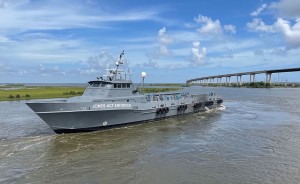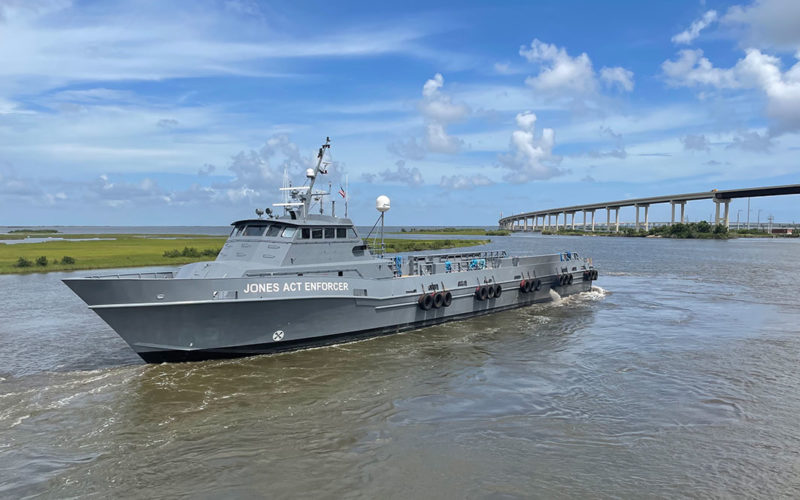
A trade group supporting U.S.-flagged offshore service companies is taking a new approach to protecting the Jones Act.
The Offshore Marine Service Association (OMSA) has activated the 175-foot fast supply vessel Jones Act Enforcer to document possible violations in and around the Gulf of Mexico. The vessel is homeported in Port Fourchon, La., but can operate from any port.
Jones Act Enforcer is the first vessel of its kind patrolling U.S. waters in search of Jones Act violations, said Aaron Smith, OMSA’s president and CEO.
“We are standing up for the men and women who make up the U.S. merchant marine,” he said in a recent interview. “They are tired of standing on the dock watching as foreign crews … go to work while they go home and sit by the phone waiting for the next job.”
“That is unfair, that is not right, and we are going to do something about it,” he continued.
OMSA, based in New Orleans, is composed of 140 maritime businesses, including about 60 that operate service vessels in U.S. waters. Other members include shipyards and marine suppliers.
The group has reported numerous potential Jones Act violations to federal regulators over the years. Specifically, its members have witnessed foreign vessels depart from U.S. ports with cargo on the deck that is gone when the ship returns, Smith said.
The organization has long advocated for the Jones Act, which it believes has been diluted by federal actions. U.S. Customs and Border Protection (CBP), OMSA said, has issued policy decisions over the years that reinterpret aspects of the law. As recently as 2019, the CBP determined foreign vessels engaged in “lifting operations” can transport cargo between two U.S. points, such as a port and offshore energy fields.
OMSA considers the agency’s decision to be “in direct contravention of the text of the Jones Act,” and it has filed a lawsuit challenging it.
CBP did not specifically address OMSA’s assertions about policy rulings allowing foreign vessels to work in the Gulf and other U.S. waters. However, in a statement the agency said “protecting the homeland from violators who circumvent the applicable laws” is a key focus.
“CBP vigorously enforces and ensures compliance with the coastwise laws,” the statement said. “CBP carefully reviews allegations involving potential coastwise violations and takes appropriate action based on the information set forth in these allegations.”
Crewmembers on foreign vessels earn a fraction of what their American counterparts make for the same work. As a result, foreign operators can underbid American companies for contracts servicing offshore platforms, depriving American firms and mariners of work within U.S. waters.
OMSA chartered Jones Act Enforcer with a full crew who work at the group’s direction. Several of OMSA’s members voluntarily increased their dues to pay for the effort, Smith said.
The crew aboard Jones Act Enforcer has been trained to identify and document Jones Act violations. The vessel also is equipped with photo and video recording equipment, including aerial surveillance gear, to capture violations as they happen.
Evidence will be shared with relevant federal regulators, Smith said. It also will be released to the media. OMSA believes the threat of public exposure could change behavior among some companies that are wary of negative publicity.
“You have heard the line that sunshine is the best disinfectant? That is what we are doing,” Smith said. “We are going to shine some light on these operations, and we are fairly confident it will change the (approach) of foreign vessels and those who hire them.”
The Louisiana Oil & Gas Association (LOGA) said it supports efforts to crack down on illegal activities in the Gulf of Mexico by foreign entities. Jones Act Enforcer, LOGA said, appears to align with that mission. However, the group offered a more nuanced position on the Jones Act.
“For 100 years, the Jones Act has contributed to the precarious lawsuit culture in Louisiana,” LOGA said in a prepared statement. “Oil and gas companies have been subject to frivolous lawsuits that result in disinvestment from Louisiana’s coastal economy.
“While many aspects of the Jones Act are antiquated and need to be amended,” the statement continued, “we are hopeful that OMSA will utilize the valuable parts of the law to protect American workers in the energy sector.”
Several other Gulf-based energy trade groups did not respond to inquiries or declined to comment.

